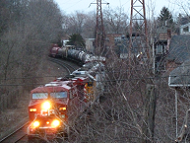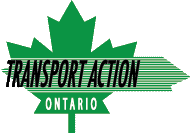By
Transport Action Ontario
|
Intercity Rail and Bus ,
Latest News ,
Northern Ontario
According to media reports, there has been notable progress in talks between Genesee and Wyoming Canada and the federal and provincial governments on much-needed track maintenance funds.
An article from Northern Ontario Business, February 25, 2020, gives more details. It is pasted below, with thanks.
– – – – – – – – – – – – – – – – – – – – – –
Genesee & Wyoming Canada is postponing its end-of-March decision to chop rail freight service between Sault Ste. Marie and Sudbury, citing “notable progress” in talks with Ottawa and Queen’s Park on much-needed track maintenance funds.
Christian Richard, the chief commercial
officer with the Montreal-headquartered railroader told Sault Ste. Marie City
Council on Feb. 24 that he’s seen enough headway in recent weeks that the
company will defer their March 31 drop-dead date “as long as there continues to
be positive signals.”
But it’ll only be a stay of execution unless
the feds and the province can cobble together a $40-million package for track
maintenance and safety upgrades to the 278-kilometre line.
In an update to city council, former Sault
mayor Steve Butland, part of a task force seeking to preserve rail service,
admitted to being “frustrated” and “disappointed” over the past two years with
their inability to secure government funding in a timely fashion.
But he and fellow former mayor Joe Fratesi
sounded upbeat in coming out of two “productive” meetings with federal associate
finance minister Mona Fortier and senior bureaucrats in Ottawa on Feb. 6, and
with provincial transportation minister Caroline Mulroney and various ministry
staff in Toronto on Feb. 20.
Fratesi believes they raised the level of
awareness in impressing upon them the importance of the railroad to the region’s
economic vitality.
“We think both levels of government are
viewing this, not as a hand out but as an investment,” he said.
The rail line services Algoma Steel in Sault
Ste. Marie, Domtar’s pulp and paper plant in Espanola and EACOM’s sawmill
operation in Nairn Centre.
It’s the third time in a decade Genesee & Wyoming has threatened to drop freight service over the condition of the tracks, and the third time Fratesi has dived in to broker a deal between the rail carrier and the government.
The line is owned by CP Rail but it doesn’t
contribute toward track maintenance. Genesee & Wyoming inherited that
responsibility when they were contracted to take over operations in 1997.
Genesee & Wyoming Canada said it invests
12 per cent of revenue generated from the Huron Central back into capital
projects every year.
But the company insists there’s not enough
freight volume there to pay for the repairs and upgrades needed, including for
new federally-mandated level crossings.
The loss of the line would jeopardize 45
railway jobs at the Huron Central, likely 200 with EACOM, and 500 jobs at
Domtar, as well as threatening the future of those north shore communities.
“If Northern Ontario is to survive and grow,”
said Fratesi, “important infrastructure such as this railway needs to continue
to be invested in by both levels of government.”
Fratesi said he further impressed upon the
politicians and bureaucrats that their recent public investments into industries
like Domtar’s Espanola operations and Algoma Steel would be for naught if those
operations were adversely impacted.
For Domtar, rail is the primary mode of moving
their specialty paper products to market.
Fratesi said transferring freight for all
these industries onto the highway would be the equivalent of putting 45,000
transport trucks on the road annually, an option that would be cost prohibitive
nor desired from an environmental perspective.
Further complicating their lobbying efforts has been the
timing of the federal and provincial elections; followed by the sale of the
Huron Central’s ultimate parent company, Connecticut-based Genesee &
Wyoming, to Brookfield Infrastructure Partners last summer; and a delay
in finalizing that sale due to a lengthy regulatory
review by the U.S. Surface Transportation Board.
On the federal funding side, investing in
short line railroads doesn’t fit the criteria of any of Ottawa’s transportation
infrastructure programming.
And provincially, the Ford government has been
exploring alternatives other than Genesee & Wyoming.
A Sudbury rail services company, Diesel Electric Services, told
Northern Ontario Business they’ve been approached by provincial
cabinet ministers Greg Rickford and Vic Fedeli to gauge their interest in
working with the Crown-owned Ontario Northland Transportation Commission in
running freight and passenger services on that line.
In what’s become a buck-passing exercise
between governments, Fratesi said he’s made it clear to both parties that their
involvement in saving the freight service is conditional on each other
cooperating.
Some online public criticism has surfaced over
taxpayer dollars being spent to subsidize a deteriorating line operated by an
otherwise profitable rail carrier.
But Fratesi argues this potential government
investment should be viewed no differently than any other mode of vital
transportation infrastructure such as highways, airports and harbours.
While there are no guarantees Genesee & Wyoming won’t be back asking for more money at a later date, Fratesi informed council he knows of two new industries that would set up shop along that line if the Huron Central were to continue operating
Photo: Huron Central train in Massey, Ontario – P199 via Wikimedia Commons






